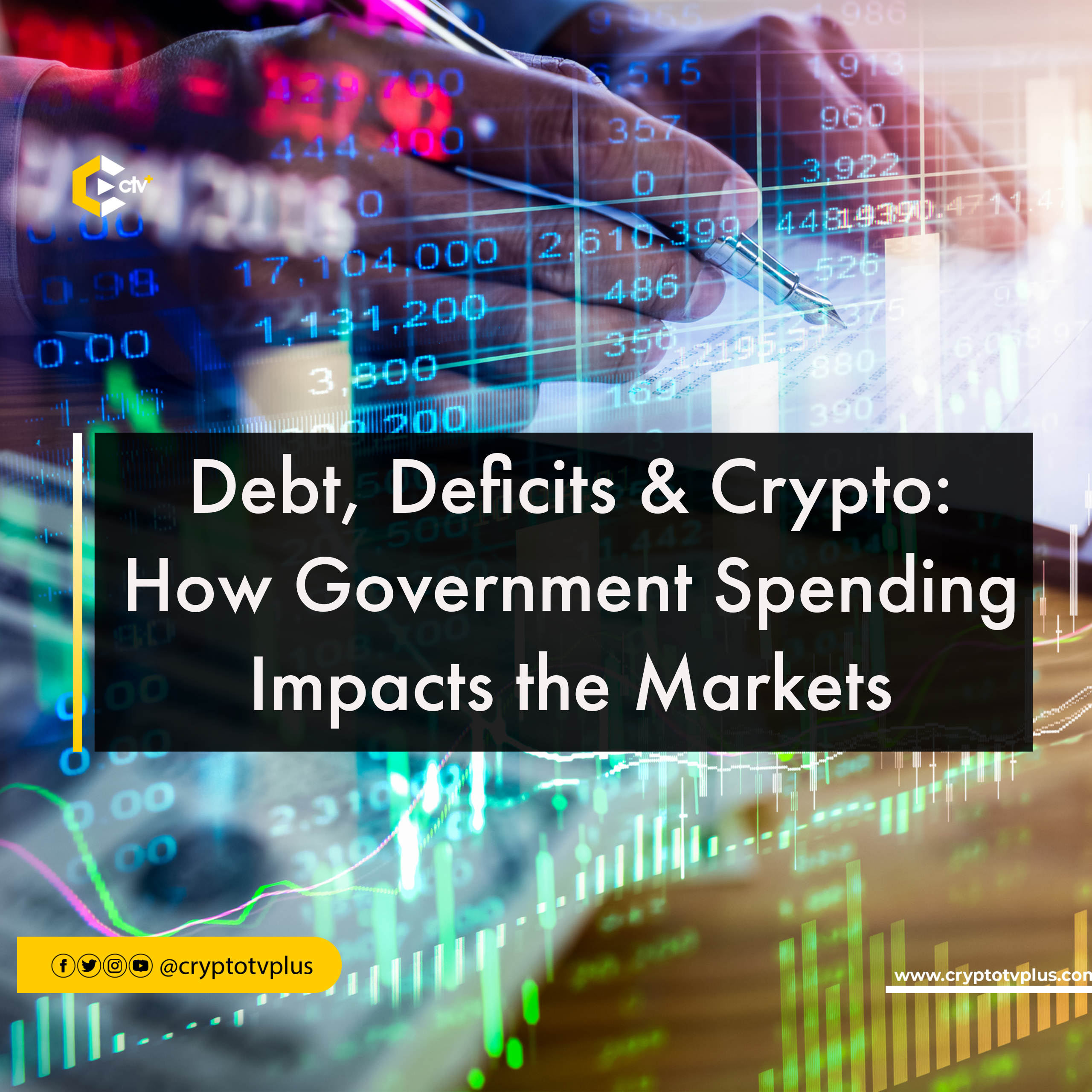FEATURED
Debt, Deficits & Crypto: How Government Spending Impacts the Markets

In today’s world, there is a constant fear around government debt and deficit spending. Many people believe that high levels of government debt and deficits are a bad thing and that the government should strive to balance its budget at all costs. Many policymakers and economists have emphasized the importance of low government debt and fiscal discipline. However, this approach can be problematic because it ignores the crucial role of government spending in supporting the private sector and promoting economic stability.
One of the main misconceptions about government spending is that it needs to be financed by taxes or borrowing. In reality, the government has the power to create money out of thin air, which means that it doesn’t need to rely on external sources of funding to finance its spending. This is a key difference between the government and the private sector, which does need real cash flows to finance its debt burdens.
The Limits of Deficit Spending
To understand the benefits of government spending, it’s important first to recognize the limits of deficit spending.
But first, what is Deficit spending?
Deficit spending is a government’s practice of spending more money than it receives in revenue. In other words, it is when a government spends more money than it collects in taxes or other sources of revenue.
Governments can engage in deficit spending to finance various projects and programs, such as infrastructure development, education, or healthcare. While government spending can help create jobs and stimulate economic growth, excessive deficit spending can lead to inflation and other economic problems.
This is because deficit spending creates more money for the private sector, which can lead to an increase in demand for goods and services. If the supply of labour and resources can’t keep up with this demand, prices will rise, leading to inflation.
However, this doesn’t mean that deficit spending is inherently bad. In fact, deficit spending can be an important tool for supporting economic growth and stability, especially during times of recession. When the private sector struggles to create jobs and generate income, government spending can help fill the gap and stimulate demand for goods and services. This can help prevent the economy from slipping into a prolonged recession or depression.
Now, while it is true that governments have the power to create money, it is important to note that the consequences of doing so depend on how that money is used and managed.
If a government prints too much money, it can lead to inflation, which can decrease the value of the currency and erode the purchasing power of individuals and businesses. This can lead to economic instability and social unrest.
Additionally, if a country relies too heavily on money printing to finance its spending, it can damage its credibility and creditworthiness, making it harder for the government to borrow money in the future.
In terms of the US dollar being the standard of settlement, if too many countries print money and thereby decrease the value of their currency, it can make it more expensive for them to purchase goods and services denominated in US dollars. This can make it more difficult for those countries to engage in international trade and can potentially harm their economies.
The Role of Government Spending in Supporting the Private Sector
- Creating jobs and income for the private sector: When the government spends money on infrastructure projects, for example, it creates demand for materials and labour, which can help support private sector businesses. Similarly, government spending on education and training can help create a more skilled and productive workforce, which can lead to higher levels of economic growth and innovation.
- Help promote stability in financial markets: Government spending can help support demand for goods and services during times of recession, which can help prevent a sharp contraction in economic activity. Without government support, the private sector may be forced to de-leverage and reduce debt burdens rapidly, leading to economic instability and potential financial crises.
Why Private Sector Debt is More Unstable than Government Debt
Private sector debt is inherently more unstable than government debt because the private sector can’t print money. Instead, private sector businesses and households must rely on real cash flows to finance their debt burdens. When a recession hits and demand for goods and services declines, these cash flows can disappear rapidly, leading to de-leveraging and economic instability.
The Danger of Obsessing Over Low Government Debt
Despite the benefits of deficit spending and government support for the private sector, many policymakers and economists continue to focus on reducing government debt and deficits. This approach can be toxic for the economy, however, because it ignores the critical role of government spending in promoting economic stability and supporting private-sector businesses.
By obsessing over low government debt, policymakers may inadvertently encourage higher levels of private sector debt, which can be more unstable and risky. In contrast, a more balanced approach to fiscal policy would recognize the benefits of government spending and use deficit spending judiciously to support economic growth and stability.
Furthermore, when the government engages in deficit spending, it creates money for the private sector. This means that the government doesn’t necessarily need money to spend money.
However, it’s important to note that excessive deficit spending can lead to inflation. If the supply of labour and real resources can’t expand rapidly enough, the private sector ends up with too much money, leading to a rise in prices. This phenomenon was observed in 2022 when we saw sharp bouts of inflation in some countries.
In 2022, a number of countries like Argentina, Brazil, Turkey and Russia, experienced sharp bouts of inflation, and the causes varied depending on the specific circumstances in each country. However, some common factors that contributed to the inflation included:
1. Supply chain disruptions: The pandemic caused disruptions to global supply chains, which led to shortages of certain goods and services, driving up their prices.
2. Increase in demand: As economies reopened and restrictions lifted, there was a surge in demand for goods and services, which led to price increases as supply struggled to keep up.
3. High energy and commodity prices: The prices of energy and commodities such as oil, gas, and metals increased, which raised the cost of production and transportation, and thereby the prices of goods and services.
4. Monetary and fiscal policies: Central banks and governments around the world implemented policies to support their economies during the pandemic, such as low-interest rates, quantitative easing, and fiscal stimulus. While these policies helped to stimulate economic growth, they also increased the money supply and led to inflationary pressures.
The consequences of inflation varied by country and depended on the severity and duration of the inflation. In some cases, inflation led to higher costs of living, reduced purchasing power, and reduced economic growth. In other cases, inflation led to social and political unrest, as citizens protested against the rising cost of living and government policies.
Despite the potential risks of excessive deficit spending, the obsession with no deficits and low government debt is even more toxic. When governments prioritize low debt levels, they often neglect to invest in important public services and infrastructure, which can lead to a host of problems such as inadequate healthcare and education systems. Additionally, the private sector is forced to take on more debt to finance its activities, which can create financial instability.
In 2020, for example, many governments implemented large stimulus packages to support households and businesses affected by the COVID-19 pandemic. These measures helped to mitigate the economic fallout of the pandemic and prevent a deep and prolonged recession.
Consequences for the crypto industry
In recent years, cryptocurrency has gained popularity as an alternative to traditional currencies, largely due to the decentralized and secure nature of blockchain technology. However, the value of cryptocurrencies can be highly volatile, and they are subject to the same economic forces as other assets like stocks, bonds, commodities and real estate.
Some examples of economic forces that affect the value of cryptocurrencies and other assets include
- Supply and demand: The value of an asset, including cryptocurrencies is affected by supply and demand dynamics. If the demand for a cryptocurrency increases while its supply remains limited the value of that cryptocurrency is likely to increase and vice versa.
- Economic growth: The performance of the broader economy can also affect the value of assets, including cryptocurrencies. Strong economic growth can increase demand for assets, leading to higher prices, while weak economic growth can reduce demand for assets, leading to lower prices.
- Interest rates: The level of interest rates can affect the value of assets, including cryptocurrencies. Higher interest rates can make assets more attractive to investors, leading to higher prices, while lower interest rates can reduce the attractiveness of assets, leading to lower prices.
- Geopolitical events: Political and geopolitical events, such as changes in government policies, trade tensions, and conflicts, can also affect the value of assets, including cryptocurrencies.
- Investor sentiment: The sentiment of investors towards an asset can affect its value, as positive sentiment can increase demand and drive up prices, while negative sentiment can reduce demand and drive down prices.
One potential positive consequence of deficit spending is that it can stimulate economic growth, leading to increased demand for cryptocurrencies. When governments engage in deficit spending, they often inject money into the economy through infrastructure projects, social programs, and tax cuts. This injection of money can increase aggregate demand, leading to increased economic activity and potentially driving up the value of cryptocurrencies.
However, this same deficit spending can also lead to inflation, which can have negative consequences for the crypto industry. Inflation erodes the purchasing power of fiat currencies, leading investors to seek alternative stores of value like cryptocurrencies. However, if inflation becomes too high, it can lead to a decrease in demand for all assets, including cryptocurrencies.
Another potential positive consequence of deficit spending on the crypto industry is the increased risk of government defaults. When governments engage in deficit spending, they increase their debt burden, which can become unsustainable if their revenue falls short of expectations. If a government defaults on its debt obligations, it can lead to a loss of investor confidence, a decrease in demand for fiat currencies, and potentially a flight to safety in cryptocurrencies. Though this option is seen as a positive consequence for the crypto industry, it can be a very negative one for the world at large.
While deficit spending can have both positive and negative consequences for the crypto industry, its overall impact depends on the specific circumstances and policies of each government. As such, it is important to consider the potential consequences of deficit spending on the crypto industry when evaluating government policies and making investment decisions.
Conclusion
Understanding the impact of government deficits on the economy can help crypto investors better navigate economic cycles and make informed investment decisions. Additionally, the concept of deficit spending raises important questions about the role of government in managing economies, and how alternative currencies like cryptocurrency may challenge traditional economic models.
While excessive deficit spending can lead to inflation and other economic problems, a singular focus on low government debt can be even more harmful. Governments need to strike a balance between managing their deficits and investing in critical public services and infrastructure. By doing so, they can help to create a stable and prosperous economy for all.
Read also: How Low Latency Can Optimize Your Crypto Trading Performance
























